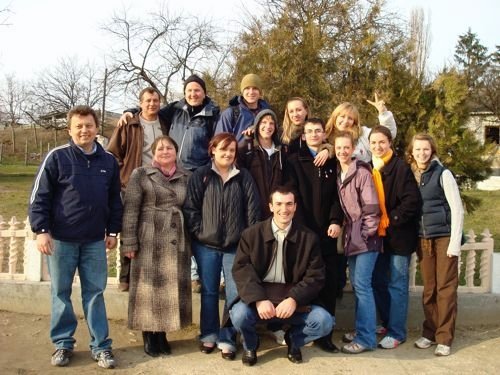This Story Isn't About Ukraine
~ This article first appeared in the Leader Vindicator newspaper. ~
It’s about Moldova, Ukraine’s neighbor to the west.
I had the opportunity to visit the country wedged beside Romania and nearly engulfed by Ukraine as a part of a class trip. I signed up for the adventure purely on a whim; so ignorant of world geography was I that, when our professor jokingly projected pictures of beautiful women on stunning beaches as examples of the country we were set to depart for, I believed him. Only after he laughed heartily did I realize that perhaps the images on display were the exact opposite of what was in store.
Our flight landed in the middle of a cold, rainy, March night outside Chisinau (pronounced kish-now). Beside the terminal I was ordered into a small taxi sedan along with the professor in charge of the trip and Cory, the only other male student in our group. Up until this moment I had never ridden in a taxi, and I found myself marveling at the reality that my initiation took place well after dark in a country I had never heard of with a chain-smoking driver who didn’t speak a lick of English operating a car that smelled strongly of cat pee and shimmied travelling eighty miles an hour on rain-slick roads to who-knows-where.
Finally we wheeled into a dark, flooded courtyard where the driver left us in the mud and sped off without a word, not because he was a jerk, but because nobody could understand him anyway. The apartment compound would be our temporary residence. Rusted door hinges howled in the night to announce our arrival, and we climbed a stairwell that reminded me of being inside a grain elevator: dark, dusty, distinct odor of organic matter in various states of decay. By now I was fully convinced the pictures from our classroom were a fraud, and with each step up I found myself lowering my bedding expectations. Would I get a mattress or just a rug? Hmm.
All three of us held our breath as the door to our room swung open. To my complete amazement, we walked into a plush residence that was very well accommodated. The surprises in Moldova got better from there.
This was, of course, an agricultural trip, so we visited the university where we met determined people spearheading an effort to revitalize food production in this country of imported sustenance. One of their biggest challenges was farmers’ collective indifference to quality, a cultural barb still lingering from the years of Soviet rule. According to our hosts, during the Communist era farmers had to produce what they were told to produce without the slightest initiative for advancement. Producers forgot how to try, and, as a result, food from Moldova was so horrendous that the country bought nearly everything it consumed.
A shame, considering the quality of the farmland we observed on our daily excursions. I remember looking out the bus window and thinking “Wow, this looks like Iowa soil!” The fields were black and rich and well tended. I couldn’t wait to tell my dad, who appreciates hearing what the dirt looks like wherever anyone goes.
Walnut trees grew along the country roads the way Hickory trees grow around Clarion. Mike, our guide, told me that people come out in droves to collect the nuts and sell them in the city for a little extra cash. Nuts were a big deal.
So were flowers. Many of the farm families we visited had greenhouses in which they grew an array of colors to be harvested and shipped to the cities for sale. There was a whole street in Chisinau lined with flower booths and teeming with shoppers. We got to trace the flowers back to the farmers, providing us a real picture of provenance. I remember standing stooped in low greenhouses heated by smoldering straw bales stuffed in homemade ovens as farmer after farmer spoke to us about their floral operations.
Every farm family we visited made wine. So popular is viniculture in Moldova that one of the stops we made was to a business that grafted vine cuttings on to rootstock. Thirteen years later, one of my most vivid memories of Moldova is the smell inside the rootstock room: warm, humid, and powerfully musty (extremely pleasant on a dreary March day). All those vines yielded grapes for household use, so when we were set to depart a farm, the farmer would brighten and bound into the basement, returning with a flagon of wine for a toast. A communal glass was passed to each person, and a sip was insufficient; each of us had to down the whole thing before passing it on. Gulp.
This is a hugely simplified recount of an experience from too many years ago, yet the memories give me a mental anchor attached to a part of the world that’s making news today. Though they aren’t under attack, I can’t imagine things are progressing as usual in Moldova right now. I’m thinking about all those people I got to meet and I’m trying to place myself in their shoes, wondering if the culture of better farming will evaporate due to instability next door. It must be frustrating, to say the least.
That’s a beautiful region on the planet, filled with good people and interesting agriculture. I wish them all the best.
